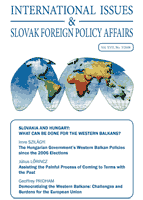Assisting the Painful Process of Coming to Terms with the Past
Assisting the Painful Process of Coming to Terms with the Past
Author(s): Július LőrinczSubject(s): Politics / Political Sciences
Published by: Research Center of the Slovak Foreign Policy Association (RC SFPA)
Keywords: Slovakia; Hungary; Western Balkans
Summary/Abstract: The Slovak development assistance to the Western Balkans has a tradition that emerged in the 90s of the previous century and its efficiency, mainly when in comes to Serbia, was at that time deepened also by the example of a quite successful struggle of the Slovak democratic forces for the face of the society and its integration into the EU and NATO. Slovakia’s relation to the Balkans has become one of the basic pillars of the strategy of the Slovak foreign policy and in fact all Slovak governments since the country’s independence in 1993 have followed this line. An important element of this policy was the emergence of the Bratislava process in 1999 as a platform of unification of the Serbian opposition and struggle for Serbia’s democratization. A great and a very efficient component of this policy is the Bratislava-Belgrade Fund that has funded 65 assistance projects. In the next period an opportunity has arisen to merge the forces of assistance to the Western Balkans in its stabilization and integration into Euro-Atlantic structures. It would be suitable to involve mainly the efforts of Slovakia and Hungary, who directly neighbor the Western Balkan states, and whose orientation belongs to the strategic priorities of Hungarian foreign policy as well. Different approaches of these two countries to certain issues, such as the recognition of Kosovo’s independence, should not become an obstacle to their cooperation in the region.
Journal: International Issues & Slovak Foreign Policy Affairs
- Issue Year: XVII/2008
- Issue No: 03
- Page Range: 63-71
- Page Count: 9
- Language: English

